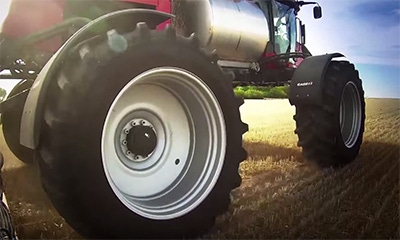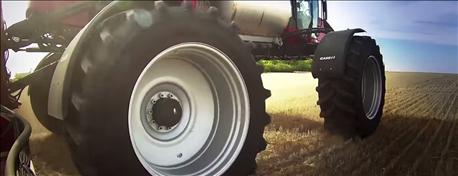August 8, 2016

Sponsored Content
As with most equipment categories, the trend in sprayers over the last decade has been increased size — bigger booms, larger tank capacity and higher horsepower — all with the promise of getting more done in less time. But this promise often comes at a price, and in the case of sprayers, that price often comes in the form of soil compaction. This is the price that Jerry McRae — a Montana wheat grower — was paying a couple seasons ago.
 Soil compaction kept this Montana wheat grower from getting seed in the ground. By switching to Goodyear® Low Sidewall Technology™ (LSW®) tires, he was able to remedy the problem.
Soil compaction kept this Montana wheat grower from getting seed in the ground. By switching to Goodyear® Low Sidewall Technology™ (LSW®) tires, he was able to remedy the problem.
McRae was running a Case Patriot 4420 sprayer — one of the industry’s larger sprayers, featuring a 1,200-gallon tank and up to a 120-foot fully extended boom. With the weight of a full tank, soil compaction became so extreme that yield was undoubtedly being affected.
“After we ran in the same track three or four times, the track got so compacted that one of our air drills actually wouldn’t reach down into it to get the seed into the ground,” says McRae.
Soil compaction is directly related to ground-bearing pressure of the tires, which can be reduced by decreasing inflation pressures and/or increasing the footprint. Typically, a Patriot 4420 sprayer comes standard from the factory with narrow tires, such as a 380/90R46. With a full tank, the machine is in the neighborhood of 35,000 pounds, and in order to carry the load, the 380/90R46 tires would need to be set at about 38 psi for 15 mph spraying operations. For McRae, getting lower inflation pressures and reducing the soil compaction required looking at a different tire setup altogether.
McRae ended up switching to Goodyear® OPTITRAC LSW800/55R46 tires, which can carry the load at a much lower inflation pressure of 12 psi (versus 38 psi), and the pressure is spread out over more than twice the footprint compared to 380/90R46 tires. Now he’s getting more work done in less time without paying the price of compaction.
“We can go higher speeds, because you’re not slowing down on every corner to make sure you don’t scuff,” says McRae. “It’s smooth, and it’s clear that there is way less compaction with LSWs, and that’s what we were looking for.”
After several successful seasons with his Goodyear LSW® setup, McRae recently decided to upgrade to an even larger sprayer — the Case Patriot 4440, and he once again turned to Goodyear LSW tires to get the performance he needed. Working with the Titan Grizz Squad, McRae swapped the standard factory setup — 620/70R38 tires — to the same Goodyear configuration he’d had so much success with on the 4420 model, ultimately reducing his pressures from 47 psi to a mere 16 psi.
For more information on the ride, stability and reduced compaction benefits of LSW technology, visit lswadvantage.com.
You May Also Like




